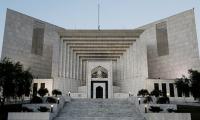ISLAMABAD: We were fighting for the United States and they were cursing us though we did not need to take part in the war. At that time, it was said Pakistan was a very dangerous place, as there were radicals and extremists, said Prime Minister Imran Khan while addressing the National Amateur Short Film Festival here on Saturday.
Imran said soft image was nothing, adding that in the war on terrorism, when Pakistanis were called extremists and fundamentalists, a defensive mindset arose in them that they should promote their soft image.
However, he emphasised that speaking English and wearing English clothes was not the soft image but a feeling of inferiority.
“The world respects the one who respects himself first. People thought if they wore English clothes and spoke English, it would be a soft image of Pakistan. I was called Taliban Khan in those days. The soft image comes automatically. The world respects those who first own it. If you want to promote a soft image, then promote Pakistaniyat,” he said.
Imran advised young Pakistani filmmakers not to be intimidated by failures and opt for original material instead of copying, saying ‘if we want to promote the soft image of our country, we must promote Pakistaniyat’.
This is a new beginning in Pakistan. I am very happy to see these short films and now we are moving in the right direction. I have seen the evolution of Pakistan's film industry and I think we started going in the wrong direction from the beginning because we were so impressed with the Indian film industry that we started imitating them. Instead of creating Pakistaniyat or our own thinking, we adopted a different culture,” he noted.
Imran said, “We started copying the Indian film industry. Only the original thing sells in the world, not copying. Ideas are accepted in the world; we have adopted the culture of others instead of our own thinking in making films. Our TV did the best job that was watched in India: come up with your own idea and don't be afraid of failure”.
He said in the 60s and 70s, people used to go to Kabul to watch movies and listen to the radio because they thought it was a better industry and if we imitated them, people would see us too. A very different culture was beginning to appear on our TV.
Referring to the instance of late vocalist, musician and composer Nusrat Fateh Ali Khan, the prime minister said he had introduced Nusrat Fateh Ali Khan to events around the world, including England and the United States, for Shaukat Khanum Cancer Hospital fund-raising and the big English pop stars started singing his items and became his fans.
Later, many Pakistani pop stars requested him to introduce them too but they didn't matter because they were copying Western bands.
He said only Nusrat Fateh Ali Khan was important and if he had not passed away, he would have become a big name in the West because they respected his skills.
Imran recalled that when he went to the England tour for the first time, seniors used to say ‘we can't win from England, we just came here to learn’.
“We were so affected by the colonial era that we lost before the tour. Matches were lost but then we started winning. Later, we invented our art, including reverse swing, and we won in ODI cricket by taking wickets from spinners at the start, especially leg spinners and this technique was also first in the world. And afterwards, the world followed us,” he maintained.
Imran said he wanted to bring some original and new thinking to the local film industry and when he became the prime minister, he said there was a lack of new content in our films. “We are influenced by Hollywood or Bollywood and it was said that if we do not bring commercial material, people will not watch it and our film will flop,” he said.
Imran said obscenity was promoted in Hollywood, which spread from there to Bollywood and a similar culture was also promoted here. At that time, he requested the Turkish President Tayyip Erdogan to take the Ertugrul drama to Pakistan. It was an alternative culture that people wanted to see.
He advised the new filmmakers not to be afraid of failure and bring their original thing.
“It is my life experience that a person who is afraid of losing can never win: always the one who wins is the one who takes risks,” he remarked.
He stressed the importance of tourism and said the highest source of income in Pakistan would be tourism.
“It has not been paid attention yet, as the rulers still go to London, leaving the country unexplored totally, whereas we are focusing on historical and religious tourism in Pakistan. Nowhere in the world are there such unique mountain ranges because half of the world's highest peaks are in our country,” he added.
The prime minister said he had high hopes for the youth adding that 60% of our youth population is very talented and after acquiring these technical skills, they will highlight the unique stories in the country.
Speaking on the occasion, Federal Minister for Information Fawad Chaudhry said the media played a crucial role in disseminating the state's narrative.
Fawad said the state was not able to fully convey the events of wars that Pakistan had fought over the years.
"We are establishing a media technology university [....] and will open film schools in Karachi."
"We will start the path to Naya Pakistan under the prime minister's leadership," he said, adding that short films would create awareness among the people.
Addressing the festival, DG Inter Services Public Relations (ISPR) Major General Babar Iftikhar said it was time for Pakistan to improve its perception at the global stage following a long and testing war on terror.
"We have almost won the war against terror [...] the terrorists damaged Pakistan's identity. It is time that we [strive to] improve our perception [in the world],” the military spokesperson added.
General Babar said in this latest era of information technology, perception was accepted as reality and people created imagine while seeing the picture. He said every country was working a lot on its perception management.
“We need to align this perception with Pakistan’s reality, which is extremely beautiful and magnificent,” he remarked.
“Today’s festival is a part of such efforts,” he added.
Gen Babar observed that perception was considered a reality in today’s world and said every country strived to build its perception. Pakistan faced a prolonged and testing war for two decades,” he said.
The enemy, besides its efforts to cause us harm through the war, has been attempting to dent the country’s stature and image before the world. Pakistan is a fortunate country that has youth making up more than 60 percent of its population. Why shouldn’t we task the youth whom we are proud of with showing the real Pakistan [to the world] alongside enabling them to test their mettle.
He also noted that capable and hardworking young filmmakers produced theme-based short films on various subjects, which will enable building Pakistan’s positive image before the world in a highly effective way.
Khawar Manika's counsel continued his arguments on Wednesday in a petition filed by Imran Khan and Bushra Bibi
IHC reserved judgment on the petition against registration of cases against former interior minister Sheikh Rashid on...
Saudi woman who was reportedly kidnapped from Islamabad’s residential Sector F-8 in mysterious circumstances, has...
Pakistan Navy warship rescued 8 Iranian fishermen after their boat caught fire in the open sea
SC dismissed appeal against SHC order that turned down application of partner seeking extension of time to furnish...
Executive board of International Monetary Fund will meet on April 29 to discuss the approval of $1.1 billion funding...






